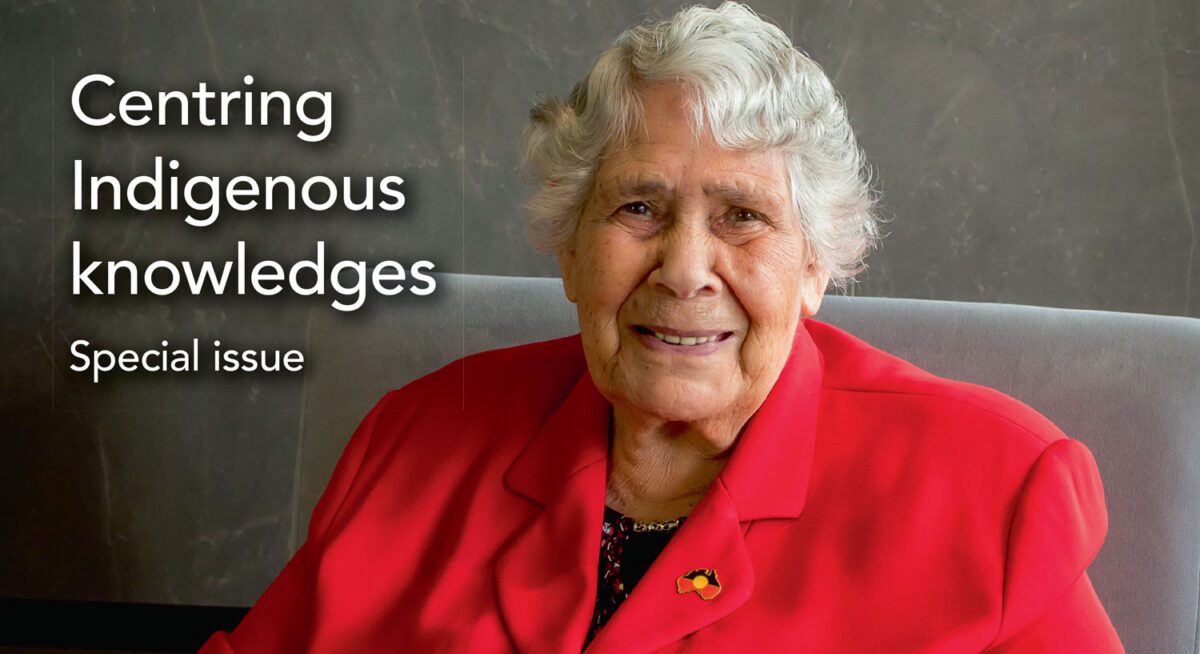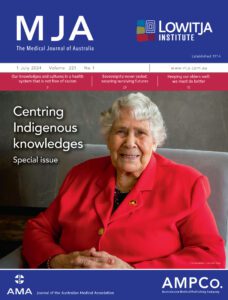Lowitja Institute partners with the Medical Journal of Australia to privilege Indigenous voices

Today the Medical Journal of Australia (MJA) will release a special issue that highlights and recognises Indigenous leadership and excellence in health and medical research.
This inaugural collaboration between Lowitja Institute and the MJA coincides with NAIDOC Week, which this year carries the theme ‘Keep the fire burning! Blak, loud and proud’.
The partnership was born out of the advocacy of Indigenous leaders, which included our former CEO Adjunct Professor Janine Mohamed, who called for greater transparency of academic literature and the need for appropriate acknowledgement of our contribution to Aboriginal and Torres Strait Islander health research (MJA 2021).
‘This is a groundbreaking initiative that strongly aligns with Lowitja Institute’s values in honour of our co-patron and namesake, the late Dr Lowitja O’Donoghue AC CBE DSG to champion research that is led by our people for our people,’ Lowitja Institute CEO Paul Stewart said.
‘As Aunty Lowitja remarked so eloquently during her speech at the Lowitja Institute International Indigenous Health and Wellbeing Conference in 2016, “We want our non-Indigenous friends and colleagues to work with us … but it is important that we know when to step up, and they know when to step aside”.’
Lowitja Institute thanks the MJA for its support in this project and acknowledges the authors for their contribution to the publication, which consists of 12 articles that span a wide range of research topics. This would have not been possible without the wonderful contribution of the authors, our guest editors and reviewers who privileged the voices of Aboriginal and Torres Strait Islander experts.
‘The MJA has a long and proud history, and we are grateful to its editorial team for working with us to place Aboriginal and Torres Strait Islander voices at the forefront. I’m excited to see the articles within this issue published and I’m confident they will contribute to dialogue within the health sector around placing greater value on Indigenous ways of knowing, being and doing – which are vital to advancing health outcomes for our mobs,’ Mr Stewart said.
A Guest Editor team comprising seven Indigenous experts in public health and clinical medicine defined the scope and aims of the special issue, assessed and selected its content, determined its editorial requirements, and nominated peer reviewers, with the support of the MJA editorial team.
The MJA’s Editor in Chief Virginia Barbour said the issue was partly a response to the outcome of the 2023 referendum to enshrine an Aboriginal and Torres Strait Islander Voice into the Australian Constitution.
‘Meaningful change will only come when those in power are prepared to step aside and let Aboriginal and Torres Strait Islander peoples lead their own affairs whilst supporting where required,’ Professor Barbour said. ‘What was clear was that our previous ways of working, by applying Western norms of publishing, has led to exclusion of papers on Indigenous health and more crucially exclusion of Indigenous health researchers.

One of the issue’s guest editors was Associate Professor Michelle Kennedy who said she hopes this issue marks the beginning of a new reciprocal relationship with the MJA.
‘Our Guest Editorial team, consisting of Aboriginal and Torres Strait Islander researchers, clinicians and policy experts have safeguarded the publishing process,’ Associate Professor Kennedy said.
‘The opportunity to draw on collective wisdom and caretaking to create this issue, which has been an honour and privilege.’
Reference: Mohamed, J., Matthews, V., Bainbridge, R., & Williams, M. 2021, ‘Who is speaking for us? Identifying Aboriginal and Torres Strait Islander scholarship in health research’, Med J Aust, vol. 215, no. 8. p. 383.

